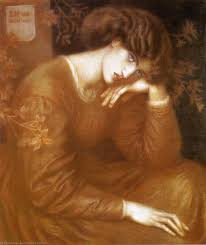-ћетки
-–убрики
- ј–“»Ќџ –ќ——≈““» (16)
- ѕ–ќ«≈–ѕ»Ќј PROSERPINA (3)
- BEATA BEATRIX (2)
- LADY LILITH@SYBILLA (2)
- ѕи€ де “оломеи (1)
- BOCCA BACIATA (1)
- «≈Ћ®Ќџ≈ –” ј¬ј (1)
- REGINA CORDIUM QUEENG of HEARTS (1)
- THE BLESSED DAMOSEL Ѕлагословенна€. (1)
- ASPECTA MEDUSA (1)
- ƒама в окне. The Lady of the Window. (1)
- ¬идение ‘иаметты. Vision of Fiammetta. (1)
- ƒневна€ мечта. The Day Dream и The Bower Meadow (1)
- „ј—“» “≈Ћј. THE BODY PARTS. (13)
- Ќј√ќ“ј ¬ »— ”——“¬≈ (5)
- ќЋЋ≈ ÷»я ‘≈“»Ў»—“ј (4)
- —“ќѕџ » »—“» скованные одной цепью. (3)
- ќЌ –≈“Ќџ≈ Ќќ∆ ». (1)
- ћќƒ≈Ћ» –ќ——≈““» (11)
- ƒ∆≈…Ќ ћќ––»— Ѕ®–ƒ≈Ќ JANE MORRIS BURDEN (4)
- ‘анни орнфорт (2)
- јЌЌ» ћ»ЋЋ≈– ANNIE MILLER (1)
- јЋ≈ —ј ¬ј…Ћƒ»Ќ√ ALEXA WILDING (1)
- ЅјЋ≈“ — “–≈“№≈√ќ я–”—ј. (9)
- HANNIBAL LECTER (5)
- ристина –оссетти (5)
- ристина –оссетти Christina Rossetti поэзи€ poems (3)
- ART DECO (4)
- √јЋ≈–≈я Ћ≈ћѕ»÷ ќ… (1)
- “јћј–ј Ћ≈ћѕ»÷ ј (1)
- „“ќ ¬ »ћ≈Ќ» “≈Ѕ≈ ћќ®ћ? (4)
- Ёлизабет —иддал (4)
- ∆»«Ќ№ ј–“»Ќ. (3)
- мо€ живопись. My paintings. (3)
- ѕќЁ«»я (1)
- јльфред “еннисон (1)
- —ѕ»—ќ ’”ƒќ∆Ќ» ќ¬ (1)
- ‘–»Ќј —≈ћ»–јƒ— ќ√ќ (1)
- Ќ»√ј ќ –ќ——≈““» (1)
- ћјЌ№≈–»«ћ (1)
- —писок работ –оссетти. The full list of Rossetti's (1)
- DOUBLE WORKS (1)
- јЌќЌ—џ –”Ѕ–» (2)
- ѕ–≈–ј‘јЁЋ»“џ (38)
- ¬—≈ ѕ–≈–ј‘јЁЋ»“џ (11)
- —ѕ–ј¬ » по ѕ–≈–ј‘јЁЋ»“јћ (4)
- ѕ–≈ƒ“≈„» (3)
- ѕ–≈–ј‘јЁЋ»“џ ¬ –ќ——»» (1)
- –ќ——≈““». ROSSETTI. (50)
- –ќ——≈““» ∆»«Ќ№ ROSSETTI LIFE (43)
- ƒжон ”иль€м ѕолидори и его ¬ампир (1)
- –ќ——≈““» —ќ —“ќ–ќЌџ (1)
- пќЁ«»я –ќ——≈““» (1)
- ћ”«≈» —ј…“џ. MUSEUMS. SITES. (15)
- ћ≈“–ќѕќЋ»“≈Ќ (3)
- ’”ƒќ∆≈—“¬≈ЌЌџ… ћ”«≈… ƒ≈Ћј¬ј–ј. (3)
- ћќ… Ё–ћ»“ј∆ (3)
- Ћ»¬Ћ≈Ќƒ— »… ћ”«≈… (1)
- ћќ» –ќћјЌџ (58)
- »— ј“≈Ћ№ 2 (41)
- роман "”читель" (9)
- ј« ≈—ћ№ (3)
- Ё «»—“≈Ќ÷»я (1)
- Novels, English versions. (1)
- мои стихи (1)
- ј—‘јЋ№“ (1)
-ћузыка
- гуд бай дарлинг
- —лушали: 169 омментарии: 0
- полный закат
- —лушали: 188 омментарии: 1
-ѕоиск по дневнику
-ѕодписка по e-mail
-»нтересы
-—ообщества
-—татистика
«аписи с меткой vampyre
(и еще 5 запис€м на сайте сопоставлена така€ метка)
ƒругие метки пользовател€ ↓
4102 annie miller beata beatrix beatrice meeting dante at a marriage feast burne-jones carlisle wall christina georgina christina georgina rossetti christina rossetti dante gabriel rossetti dudley gallery edward poynter edward robert hughes eleanor fortescue-brickdale elizabeth siddal eugene onegin feet fetish first anniversary ford madox brown frederic william burton gabriel charles dante gabriel charls dante rossetti girls goblin market hans suren honesuckle john inchbold john roddam spencer stanhope karl truppe kelmscort manor lady lawrence list of pre-raphaelite paintings mariana mary magdalene at the door of simon the pharisee mary nazarene naked nude painting pallas rossetti sevenoaks smeralda bandinelli the third reich the glacier of roselaui the lady of shalott ulalume venus verticordia w b scott walter deverell water willow william holman hunt william michael working men's college ад данте / dante's inferno 1967 артур хьюз балет грант вуд данте данте габриэль россетти джейн моррис живопись искатель искусство канадский сурок кеннет кларк кристина россетти лемпицка лемпицка€ мариинский менады моррис нагота новый роман ножки пи€ де толомеи прерафаэлиты прозерпина роман россетти сиддал сомова уиль€м моррис фетиш хант хьюз чаадаев часовн€ подеста э л б е р т г р э м эвелин де морган эдвард роберт хьюз элизабет сиддал
–ќ——≈““» ∆»«Ќ№ » “¬ќ–„≈—“¬ќ. THE LIFE AND OEUVRE. 1867-69 |
ƒневник |
–ќ——≈““» ∆»«Ќ№ » “¬ќ–„≈—“¬ќ. THE LIFE AND OEUVRE. 1867-69
ћечтательность 1868 г.
ѕосле смерти —иддал –оссетти поместил в еЄ гроб рукопись стихов, которые он планировал опубликовать после перевода Early Italian Poets (1861). ¬ 1869 году рукопись извлечена из гроба и опубликована в 1870 году. ≈го Poems 1870 включали эксгумированные из могилы Ћиззи и новые, вдохновлЄнные ƒжейн с которой он прожил следующее лето в Kelmscort Manor.

Pandora (first finished study) 1869
—уществует несколько вариантов мифа о ѕандоре, один из которых изложен в книге The generall history of Women Author: Heywood, Thomas. экземпл€ром которой владел –оссетти. ѕо этой версии ѕандора сама открыла €щик, содержавший все бедстви€ и несчасть€, и выпустила их в мир, на дне осталась только Ќадежда.
— 1869 года –оссетти всЄ чаще обращалс€ к рисунку мелом, обычно на тонированной зелЄной или голубой бумаге. Ќа тему мифа о ѕандоре он создал несколько работ мелом и картину маслом. ѕоза на данном рисунке, возможно, вз€та с одной из фотографий, сделанных –оссетти в 1865 году с ћоррис.

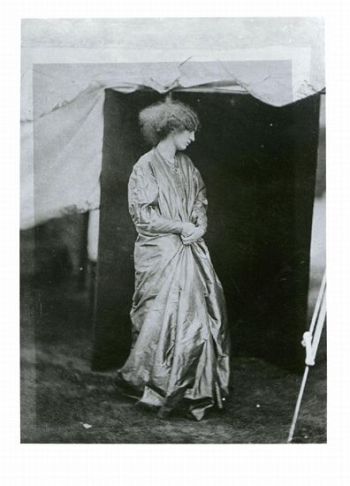
на многих фото подчЄркнута длина и выразительность рук, во всех картинах, написанных –оссетти с ћоррис руки играют важную роль.
 ѕрава€ рука ћоррис напоминает левую у Michelangelo's "Dawn" in Medici Chapel.
ѕрава€ рука ћоррис напоминает левую у Michelangelo's "Dawn" in Medici Chapel.
EPIMETHEUS was the Titan god of afterthought and excuses. He and his brother Prometheus were given the task of populating the earth with animals and men. However, Epimetheus quickly exhausted the supply of gifts allotted for the task in the equipment of animals, leaving Prometheus' masterpiece, mankind, completely helpless. As a result the Titan brother was forced to steal fire from heaven to arm them. Zeus was angered by this theft and ordered the creation of Pandora, the first woman, as a means to deliver evil into the house of man. Despite the warnings of his brother, Epimetheus happily received her as his bride, but as soon as she arrived she lifted the lid of a jar entrusted her by the gods, releasing a plague of harmful daimones (spirits) to trouble mankind. Only Hope (Elpis) remained behind to succor the unfortunate race. Epimetheus' name was derived from the Greek words epi-, epeita, and mêtis, and means "afterthought" or "late counselling." Pindar calls Afterthought (Epimetheus) the father of Excuse (Prophasis). He was the proverbial fool.
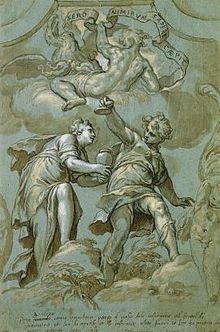
Epimetheus received Pandora as a gift from the gods; a human created by the gods specifically to punish the humans.
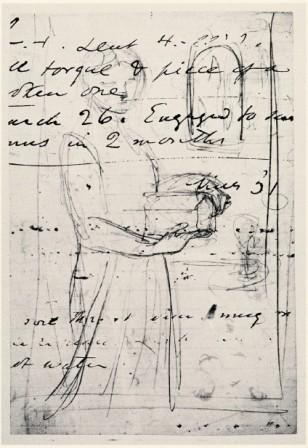 Pandora, sketch
Pandora, sketch
1869 (circa) Medium: pencil on lined note paper Dimensions: 19.7 x 13.2 cm

Pandora
1870 (circa)Medium: watercolour Dimensions: 39 3/4 x 24 1/2 in. Note: Monogram located at lower right.
1874-8

ƒанна€ верси€ отличаетс€ от рисунка 1869 года, плечи даже более массивные чем в Astarte Syriaca и напоминают Cumaen Sibil of the Sistine ceillng. Ќа коробке теперь надпись VLTIMA MANET SPES и крылата€ голова Ќадежды с подсолнухами. ”грожающее и маниакальное движение заменили летаргическую мрачность ранних версий.
ultima manet spes the last hope remains остаЄтс€ последн€€ надежда.
”читыва€, что Ќадежду забыли выпустить и она осталась на дне звучит двусмысленно. ѕочему "V" а не "U", непон€тно. Ћатынь хреново знал?
Cumaen Sibil of the Sistine
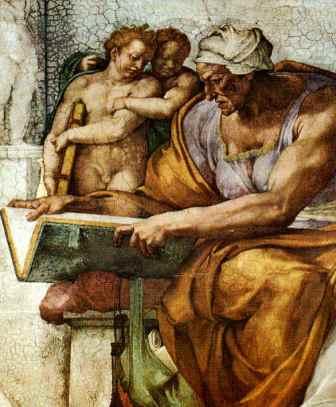
ѕосле смерти —иддал –оссетти поместил в еЄ гроб рукопись стихов, которые он планировал опубликовать после перевода Early Italian Poets (1861). ¬ 1869 году рукопись извлечена из гроба и опубликована в 1870 году. ≈го Poems 1870 включали эксгумированные из могилы Ћиззи и новые, вдохновлЄнные ƒжейн с которой он прожил следующее лето в Kelmscort Manor.
ѕосле смерти —иддал –оссетти поместил в еЄ гроб рукопись стихов, которые он планировал опубликовать после перевода Early Italian Poets (1861). ¬ 1869 году рукопись извлечена из гроба и опубликована в 1870 году. ≈го Poems 1870 включали эксгумированные из могилы Ћиззи и новые, вдохновлЄнные ƒжейн с которой он прожил следующее лето в Kelmscort Manor.
«ѕриветствие Ѕеатриче» —, созданна€ в 1869 году. артина не св€зана с одноимЄнными работами –оссетти, созданными в 1859 и 1880 году.
Ќатурщицей дл€ образа Ѕеатриче стала ƒжейн ћоррис. —южет картины вз€т из стихотворени€ ƒанте јлигьери «Ќова€ жизнь», где ƒанте впервые встречает Ѕеатриче. ѕосле смерти своей супруги Ёлизабет —иддал, также изображавшейс€ –оссетти в образе Ѕеатриче, художник ассоциировал свои чувства к ƒжейн ћоррис, находившейс€ замужем, с историей ƒанте и Ѕеатриче. “екст на картине вверху слева — вз€ты из сонета јлигьери (из XXVI части, начина€ словами Tanto gentile e tanto onesta pare [—толь благородна, столь скромна бывает…]
| ѕриветствие Ѕеатриче. 1869 | |
| The Salutation of Beatrice | |
| ’олст, масло. 57,1 × 47 см |

|
||
| ƒанте √абриэль –оссетти | ||
| ѕи€ де “оломеи. 1868 | ||
| Pia de' Tolomei | ||
| ’олст, масло. 105,4 × 120,6 см | ||
| ћузей искусств —пенсера, Ћоуренс | ||
ѕи€ де “оломеи. La Pia
ћетки: Vampyre Maria Francesca Gabriel Charles Dante William Michael Christina Georgina |
–ќ——≈““» ∆»«Ќ№ » “¬ќ–„≈—“¬ќ. THE LIFE AND OEUVRE. 1867-69 |
ƒневник |
–ќ——≈““» ∆»«Ќ№ » “¬ќ–„≈—“¬ќ. THE LIFE AND OEUVRE. 1867-69
ћечтательность 1868 г.
ѕосле смерти —иддал –оссетти поместил в еЄ гроб рукопись стихов, которые он планировал опубликовать после перевода Early Italian Poets (1861). ¬ 1869 году рукопись извлечена из гроба и опубликована в 1870 году. ≈го Poems 1870 включали эксгумированные из могилы Ћиззи и новые, вдохновлЄнные ƒжейн с которой он прожил следующее лето в Kelmscort Manor.

Pandora (first finished study) 1869
—уществует несколько вариантов мифа о ѕандоре, один из которых изложен в книге The generall history of Women Author: Heywood, Thomas. экземпл€ром которой владел –оссетти. ѕо этой версии ѕандора сама открыла €щик, содержавший все бедстви€ и несчасть€, и выпустила их в мир, на дне осталась только Ќадежда.
— 1869 года –оссетти всЄ чаще обращалс€ к рисунку мелом, обычно на тонированной зелЄной или голубой бумаге. Ќа тему мифа о ѕандоре он создал несколько работ мелом и картину маслом. ѕоза на данном рисунке, возможно, вз€та с одной из фотографий, сделанных –оссетти в 1865 году с ћоррис.


на многих фото подчЄркнута длина и выразительность рук, во всех картинах, написанных –оссетти с ћоррис руки играют важную роль.
 ѕрава€ рука ћоррис напоминает левую у Michelangelo's "Dawn" in Medici Chapel.
ѕрава€ рука ћоррис напоминает левую у Michelangelo's "Dawn" in Medici Chapel.
EPIMETHEUS was the Titan god of afterthought and excuses. He and his brother Prometheus were given the task of populating the earth with animals and men. However, Epimetheus quickly exhausted the supply of gifts allotted for the task in the equipment of animals, leaving Prometheus' masterpiece, mankind, completely helpless. As a result the Titan brother was forced to steal fire from heaven to arm them. Zeus was angered by this theft and ordered the creation of Pandora, the first woman, as a means to deliver evil into the house of man. Despite the warnings of his brother, Epimetheus happily received her as his bride, but as soon as she arrived she lifted the lid of a jar entrusted her by the gods, releasing a plague of harmful daimones (spirits) to trouble mankind. Only Hope (Elpis) remained behind to succor the unfortunate race. Epimetheus' name was derived from the Greek words epi-, epeita, and mêtis, and means "afterthought" or "late counselling." Pindar calls Afterthought (Epimetheus) the father of Excuse (Prophasis). He was the proverbial fool.

Epimetheus received Pandora as a gift from the gods; a human created by the gods specifically to punish the humans.
 Pandora, sketch
Pandora, sketch
1869 (circa) Medium: pencil on lined note paper Dimensions: 19.7 x 13.2 cm

Pandora
1870 (circa)Medium: watercolour Dimensions: 39 3/4 x 24 1/2 in. Note: Monogram located at lower right.
1874-8

ƒанна€ верси€ отличаетс€ от рисунка 1869 года, плечи даже более массивные чем в Astarte Syriaca и напоминают Cumaen Sibil of the Sistine ceillng. Ќа коробке теперь надпись VLTIMA MANET SPES и крылата€ голова Ќадежды с подсолнухами. ”грожающее и маниакальное движение заменили летаргическую мрачность ранних версий.
ultima manet spes the last hope remains остаЄтс€ последн€€ надежда.
”читыва€, что Ќадежду забыли выпустить и она осталась на дне звучит двусмысленно. ѕочему "V" а не "U", непон€тно. Ћатынь хреново знал?
Cumaen Sibil of the Sistine

ѕосле смерти —иддал –оссетти поместил в еЄ гроб рукопись стихов, которые он планировал опубликовать после перевода Early Italian Poets (1861). ¬ 1869 году рукопись извлечена из гроба и опубликована в 1870 году. ≈го Poems 1870 включали эксгумированные из могилы Ћиззи и новые, вдохновлЄнные ƒжейн с которой он прожил следующее лето в Kelmscort Manor.
ѕосле смерти —иддал –оссетти поместил в еЄ гроб рукопись стихов, которые он планировал опубликовать после перевода Early Italian Poets (1861). ¬ 1869 году рукопись извлечена из гроба и опубликована в 1870 году. ≈го Poems 1870 включали эксгумированные из могилы Ћиззи и новые, вдохновлЄнные ƒжейн с которой он прожил следующее лето в Kelmscort Manor.
«ѕриветствие Ѕеатриче» —, созданна€ в 1869 году. артина не св€зана с одноимЄнными работами –оссетти, созданными в 1859 и 1880 году.
Ќатурщицей дл€ образа Ѕеатриче стала ƒжейн ћоррис. —южет картины вз€т из стихотворени€ ƒанте јлигьери «Ќова€ жизнь», где ƒанте впервые встречает Ѕеатриче. ѕосле смерти своей супруги Ёлизабет —иддал, также изображавшейс€ –оссетти в образе Ѕеатриче, художник ассоциировал свои чувства к ƒжейн ћоррис, находившейс€ замужем, с историей ƒанте и Ѕеатриче. “екст на картине вверху слева — вз€ты из сонета јлигьери (из XXVI части, начина€ словами Tanto gentile e tanto onesta pare [—толь благородна, столь скромна бывает…]
| ѕриветствие Ѕеатриче. 1869 | |
| The Salutation of Beatrice | |
| ’олст, масло. 57,1 × 47 см |

|
||
| ƒанте √абриэль –оссетти | ||
| ѕи€ де “оломеи. 1868 | ||
| Pia de' Tolomei | ||
| ’олст, масло. 105,4 × 120,6 см | ||
| ћузей искусств —пенсера, Ћоуренс | ||
ѕи€ де “оломеи. La Pia
ћетки: Vampyre Maria Francesca Gabriel Charles Dante William Michael Christina Georgina |
–»—“»Ќј –ќ——≈““» |
ƒневник |
Christina Georgina Rossetti
–»—“»Ќј –ќ——≈““».

Meghan Barrett
ристина –оссетти - одна из наиболее значительных поэтесс, творивших в јнглии 19 века в "¬икторианскую эпоху", широко известны такие еЄ работы, как «ярмарка гоблинов» (1862), «The Prince's Progress" (1866), «—ин-—он – книга детских стихов» (1872), а также многие отдельные стихи и поэмы. ристина стала первым писателем, ассоциировавшимс€ с ѕрерафаэлитами, кто привлЄк внимание критики.
ќна родилась в Ћондоне 5 декабр€ 1830 года в семье √абриел€ и ‘рансис (ѕолидоры) –оссетти и была младшей из четырЄх детей. ƒовольно зажиточные в то врем€, –оссетти были частью среднего класса. ‘рансис Ћавини€, мать ристины, работавша€ до замужества гувернанткой, происходила из намного более зажиточной семьи. She was the sister of Dr John Polidori, Byron's physician companion and author of the Vampyre (1819).
’от€ в детстве ристина была очень живым и проказливым ребЄнком она была достойной представительницей замечательной семьи поэтов и унаследовала многие художественные тенденции у своего отца, рано начала писать стихи. ќднако во взрослой жизни ристина сохранив острый ум и поэтический талант последовала за своей старшей сестрой ћарией по пути јнгло- атолической набожности и самоотречени€, что вступало в конфликт с еЄ стремлением к поэтической славе. ристина на прот€жении всей жизни часто болела. Ёта болезненность отчасти объ€сн€етс€ тем, что ристина вынуждена была оставатьс€ дома и ухаживать за отцом, предполагают, что болезнь была некоей формой протеста. ристина –оссетти умерла от рака в 1894 году.
¬ возрасте 18 лет она позировала дл€ картины –оссетти The Girlhood of Mary Virgin (for Mary), а в 20 лет в том же образе дл€ Ecce Ancilla Domini!
—уд€ по еЄ до некоторой степени идеализированным изображени€м, исполненным еЄ братом √абриелем –оссетти, ристина – подросток была очень привлекательна, если не красива. ¬ 1848 году она обручилась с ƒжеймсом оллинзом, одним из малоизвестных членов братства ѕрерафаэлитов, но помолвка была расторгнута после его обращени€ в католицизм. ристина же разделила со своей старшей сестрой ћарией набожность и суровое самоотречение јнгло-католического толка, что вступало в противоречие с еЄ желанием приобрести известность как поэтесса. —читаетс€, что еЄ творчество в частности ассонансы оказали большое вли€ние на Algernon Swinburn. ристина много занималась благотворительностью, еЄ поэтический шедевр Goblin Market возник из опыта работы по социальной адаптации бывших проституток..
огда из-за ухудшившегос€ здоровь€ и зрени€ профессор –оссетти ушЄл в отставку, ристина и еЄ мать пытались организовать школу, но через год отказались от этой затеи. ¬последствии она вела довольно уединенную жизнь, монотонность которой прерывалась частыми болезн€ми, которые диагностировались как ангина или туберкулЄз. — начала 60-х она влюблена в „арльза айле€, но по свидетельству еЄ брата отказалась от брака, так как обнаружила, что он не христианин. ¬се три женщины семьи –оссетти сначала преданные последователи евангелистской ветви англиканской церкви, с начала 40-х склон€ютс€ к тракторианству. ќднако продолжают относитьс€ к евангелизму серьЄзно. ћэри, в конечном счЄте, становитс€ монашенкой.
ј религиозные угрызени€ совести ристины напоминают метани€ ƒоротеи Ѕрук в романе ∆оржа Ёлиота Middlemarch. √ероин€ Ёлиота стремилась отказатьс€ от верховой езды, так она доставл€ла ей удовольствие, ристина отказалась от шахмат, так как любила выигрывать. ќна наклеивала бумажки на антирелигиозные части любимых литературных произведений, возражала против ню (особенно женского) в живописи и отказывалась даже посмотреть ѕарсифаль ¬агнера из-за того, что там воспеваетс€ €зыческа€ мифологи€.
Christina Georgina Rossetti, one of the most important women poets writing in nineteenth-century England with such works as "The Goblin Market" (1862), "The Prince's Progress" (1866), "Sing-Song A Nursery Rhyme Book" (1872), along with many other individual poems. She was born in London December 5, 1830, to Gabriele and Frances (Polidori) Rossetti. Better off than some during this time, the Rossettis were a part of the middle class. Christina's father, Gabriel Rossetti, was from a working class family. After Gabriel was exiled from Italy, due to his association with Napolean, he came to London in 1824 and began working as an Italian teacher. Frances Lavinia, Christina's mother, who worked as a governess before marrying, came from a much wealthier family.
Although her fundamentally religious temperament was closer to her mother's, this youngest member of a remarkable family of poets, artists, and critics inherited many of her artistic tendencies from her father. Christina Rossetti was ill off and on throughout most of her life. Much of her illness could perhaps be due to the fact that she was forced to stay at home and care for her father; some say her illness was a form of rebellion. Christina Rossetti eventually died of cancer on December 29, 1894.
Judging from somewhat idealized sketches made by her brother Dante, Christina as a teenager seems to have been quite attractive if not beautiful. In 1848 she became engaged to James Collinson, one of the minor Pre-Raphaelite brethren, but the engagement ended after he reverted to Roman Catholicism.
When Professor Rossetti's failing health and eyesight forced him into retirement in 1853, Christina and her mother attempted to support the family by starting a day school, but had to give it up after a year or so. Thereafter she led a very retiring life, interrupted by a recurring illness which was sometimes diagnosed as angina and sometimes tuberculosis. From the early '60s on she was in love with Charles Cayley, but according to her brother William, refused to marry him because "she enquired into his creed and found he was not a Christian.
All three Rossetti women, at first devout members of the evangelical branch of the Church of England, were drawn toward the Tractarians in the 1840s. They nevertheless retained their evangelical seriousness: Maria eventually became an Anglican nun,
and Christina's religious scruples remind one of Dorothea Brooke in George Eliot's Middlemarch : as Eliot's heroine looked forward to giving up riding because she enjoyed it so much, so Christina gave up chess because she found she enjoyed winning; pasted paper strips over the antireligious parts of Swinburne's Atalanta in Calydon (which allowed her to enjoy the poem very much); objected to nudity in painting, especially if the artist was a woman; and refused even to go see Wagner's Parsifal, because it celebrated a pagan mythology.

ѕример повседневного плать€ ристины.
Example of Christina Rossetti's everyday attire
ћетки: Christina Rossetti Christina Georgina Rossetti Vampyre Dr John Polidori Byron |
| —траницы: | [1] |







